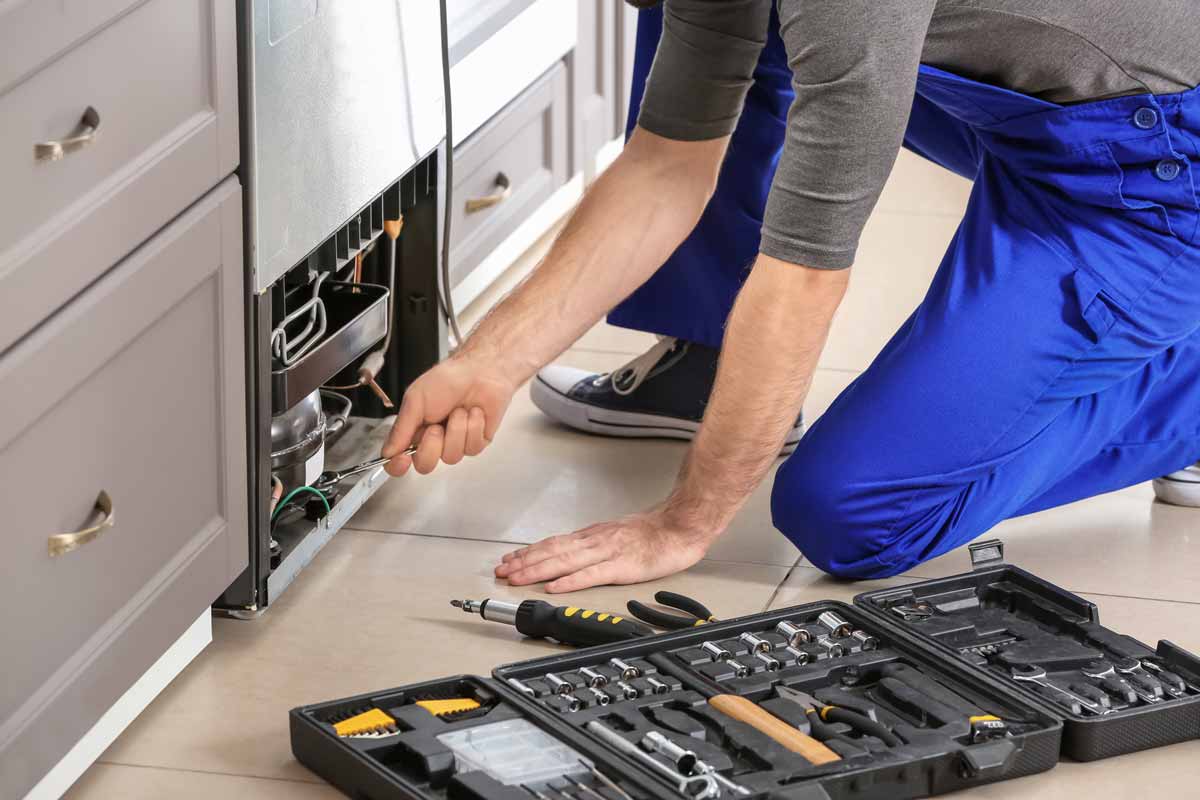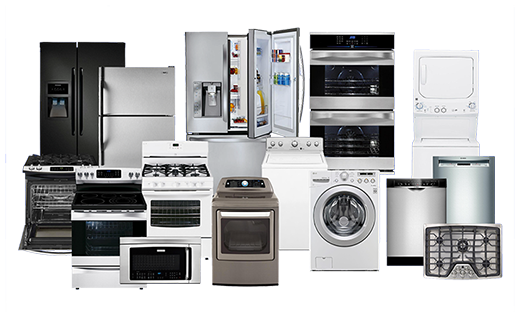The Ultimate Guide to Understanding Device Repair at Home
When your refrigerator stops cooling or your stove declines to warm, it can really feel frustrating. Recognizing device repair at home can save you time and money. You'll discover to acknowledge symptoms, use necessary devices, and adhere to an organized troubleshooting procedure. Yet prior to you begin, there are essential security precautions you require to consider. What are the most common problems, and how can you repair them? Allow's explore the essentials.
Common Home Appliance Issues and Their Symptoms
When your home appliances begin breaking down, it's important to identify the indicators beforehand. Overlooking them can bring about bigger concerns and pricey fixings. For instance, if your fridge isn't cooling correctly, you could see warm areas or condensation forming. This could show a falling short compressor or a blocked vent.Your dish washer might reveal troubles via unclean recipes or uncommon sounds throughout cycles. If you hear grinding or clanking, it's time to investigate.A washing machine that won't rotate or drain pipes can leave you with soaked laundry, suggesting a clogged drain or a malfunctioning pump.Lastly, if your oven's temperature level appears off or it takes forever to pre-heat, you may be handling a defective thermostat. By remaining alert to these signs and symptoms, you can address concerns before they rise right into major repairs.
Important Devices for Home Appliance Repair Work
When you're dealing with device repairs in your home, having the right devices is vital. Basic hand devices like screwdrivers and pliers will certainly help you disassemble and fix different devices, while electrical screening gadgets guarantee you're working securely with circuitry. Let's discuss what you require to get going on your repair work journey.
Fundamental Hand Tools
Having the right devices is crucial for effective appliance repair work in the house. Start with a dependable screwdriver set, including both flathead and Phillips types, as screws prevail in device assembly. Pliers are also important; they aid with gripping, turning, and reducing cables or little elements. A pair of needle-nose pliers can get to limited spots quickly. You'll need a good flexible wrench for tightening or loosening nuts and screws. An utility blade is convenient for cutting via product packaging or insulation. Don't fail to remember a sturdy workbench or surface area to securely organize your devices and parts. With these standard hand tools, you'll be well-prepared to take on most home appliance fixings that come your method.
Electrical Testing Tools
Together with basic hand devices, electric testing devices play an important function in home appliance repair work. These tools assist you diagnose electrical issues and guarantee appliances function securely. A multimeter is crucial; it determines voltage, present, and resistance, allowing you to pinpoint issues swiftly. A non-contact voltage tester is one more essential, allowing you spot real-time wires without making straight call, boosting your safety. Secure meters are wonderful for measuring existing circulation in wires without detaching them, conserving you effort and time. In addition, circuit testers can rapidly inspect if electrical outlets are operating properly. By utilizing these gadgets, you'll simplify your troubleshooting procedure and improve your fixing skills, making device maintenance a lot much easier.
Step-by-Step Overview to Diagnosing Appliance Issues
When your appliance breaks down, it can be aggravating, but detecting the problem does not have to be frustrating. You'll learn to determine typical issues and apply effective fixing methods. Allow's go through the actions to obtain your device back in functioning order.
Typical Home Appliance Issues

Fixing Strategies Explained

Fixing Major Kitchen Appliances: A Closer Look
Have you ever asked yourself just how to deal with common concerns with your kitchen devices? Fixing significant cooking area appliances like refrigerators, ovens, and dishwashers can be less complicated than you assume. Begin by recognizing the problem-- whether it's a refrigerator not cooling or an oven that will not heat up. Frequently, a simple reset or inspecting the power source can solve the issue.For fridges, tidy the condenser coils and check the door seals. If your oven's not home heating, inspect the burner and thermostat. Dishwashers might simply require a tidy filter or a reset to get them back at work. Always disconnect the home appliance before diving right into repairs to guarantee your safety.Don' t fail to remember to speak with the customer manual for certain repairing tips associated to your version. With a little persistence and the right tools, you can with confidence deal with device repair services and save cash while doing so!

Troubleshooting Laundry Equipments: Tips and Techniques
When your laundry appliances start acting up, it can feel overwhelming, but troubleshooting them doesn't have to be a trouble. Begin by inspecting the power supply. Confirm the home appliance is plugged in and the outlet is operating. Next, examine the door or lid switch; a defective button can stop the device from operating.For washing machines, if it's not spinning, check for out of balance loads. Redistributing the garments could resolve the concern. If your dryer isn't heating, tidy the dust filter and examine the vent for blockages.Listen for unusual noises; they can indicate an issue. If your home appliance is dripping, examine the tubes for splits or loosened links. Document any kind of error codes presented on digital screens, as they can direct you in determining the problem. Get in touch with the customer guidebook for specific troubleshooting ideas connected to your model.
Safety Precautions to Take During Repair works
Before you start any appliance repairs, it's necessary to prioritize security to stop mishaps or injuries. First, unplug the appliance or shut off the circuit breaker to guarantee no power reaches it while you function. Use insulated devices to reduce the danger of electrical shock. Put on security goggles and handwear covers to shield yourself from sharp edges or debris (Washer dryer repair service Dependable Refrigeration).Make certain your work area is tidy and well-lit, so you can see what you're doing. Maintain children and pets away from the area to stay clear of diversions and possible dangers. If you're dealing with gas home appliances, be extra careful; look for leaks prior to proceeding.Take your time, and don't rush via repairs. If you really feel unsure about any step, it's far better to stop briefly and research study than to guess. Complying with these precautions will aid create a Click This Link safer atmosphere for your do it yourself appliance repair service project
When to Call an Expert for Assistance
Just how do you understand if it's time to contact a professional for home appliance repair work? If you've attempted basic troubleshooting without success, it's a clear sign. If your appliance still won't start or shows uncommon noises after resetting it, do not wait to look for professional help.When you notice midwest appliance repair leaks, smoke, or melting scents, focus on safety and security and call a professional instantly. These problems can result in more significant damage or position risks to your home.Also, if your home appliance is under warranty, calling a specialist is frequently the most effective course. They can assure that repairs won't nullify your warranty, saving you money in the long run.Finally, if you're unclear or unpleasant with intricate repair work, it's a good idea to leave it to the professionals. Bear in mind, taking on complicated problems without the appropriate experience can result in costly mistakes. Depend on a specialist when doubtful!
Frequently Asked Inquiries
Exactly How Can I Protect Against Appliance Troubles in the Future?
To stop home appliance problems in the future, you need to do routine upkeep, look for deterioration, tidy filters, and stay clear of overloading. Staying aggressive will aid prolong their lifespan and maintain them running efficiently.
What Are one of the most Common Do It Yourself Home Appliance Fixing Mistakes?
You may forget security preventative measures, avoid repairing steps, or utilize incorrect devices when attempting do it yourself appliance repair services. Hurrying the procedure or disregarding supplier guidelines can result in even more substantial issues and costly mistakes. Stay client and notified!
Just how Do I Know if a Component Needs Replacement?
You can tell if a part requires replacement by examining for uncommon sounds, leaks, or irregular efficiency. If the appliance has a hard time to operate properly or reveals visible damage, it's likely time for a substitute.
Can I Use Generic Components for Appliance Repairs?
Yes, you can make use of common parts for device repair services, but identify they're suitable - Dependable Refrigeration & Appliance Repair Service Washer repair near me. Generic parts could save you cash, but they can impact performance or durability, so evaluate your options very carefully before choosing
What Service Warranties Cover Device Fixes?
The majority of device guarantees cover repair work for manufacturing defects, yet they usually leave out damage from misuse. Inspect your warranty terms very carefully, as some could need making use of licensed professionals and original components for coverage to stay legitimate.